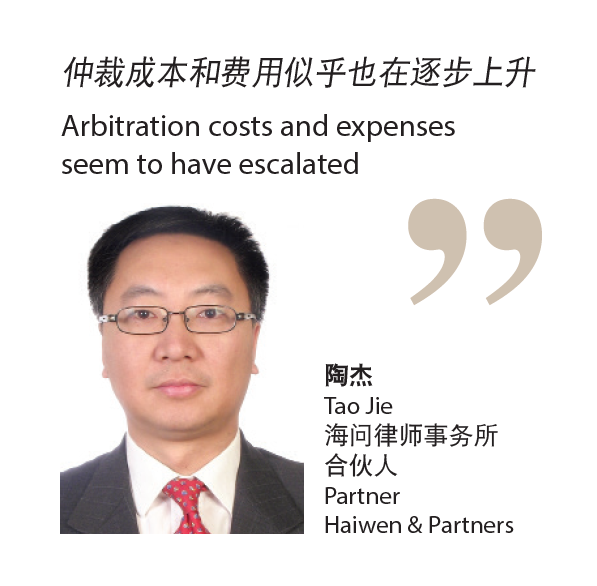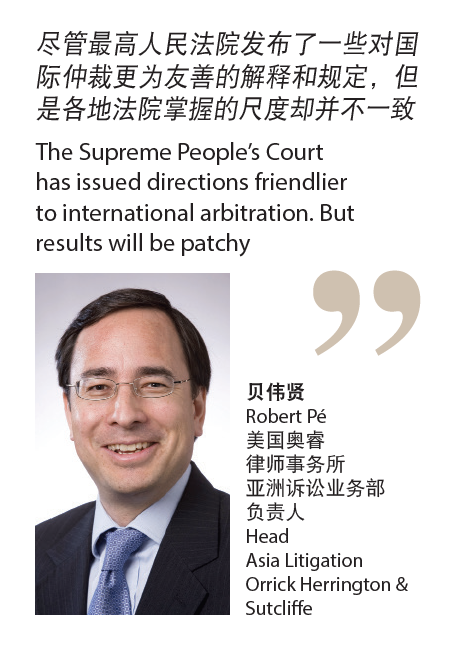China now conducts more arbitrations than any other country. Yet arbitration remains a difficult area with competing forums, confusing legal rulings and a perception that some awards may not be enforced. George W Russell reports
China’s judicial system handled 6,433,585 civil lawsuits in 2009, a rise of 8.41% over the previous year. With so many cases clogging the courts, it is hardly surprising that companies and individuals alike have turned to arbitration as an alternative means of resolving disputes.
One of the driving forces has been a regulation issued in 2009, the Supreme People’s Court Establishing a Sound Conflict and Dispute Resolution Mechanism that Connects Litigation and Non-litigation Several Opinions, that encourages parties in dispute to use arbitration or mediation rather than litigation. The regulation has helped propel China’s arbitration system into the top global spot. “The People’s Republic of China now conducts more arbitrations than any other country and has become one of the most important places for commercial arbitrations in the world,” Terence Tung, a partner at Mayer Brown in Beijing, noted in January.
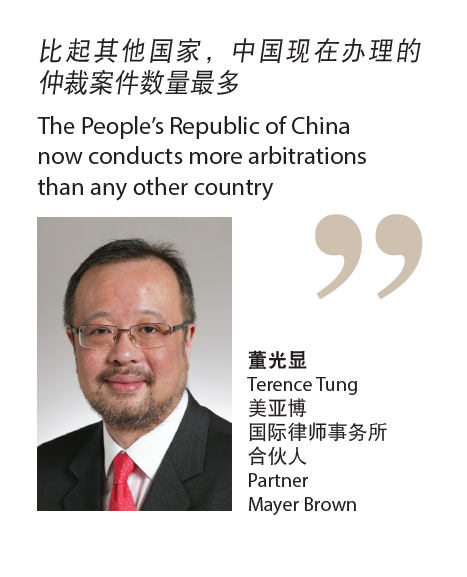
Foreign-related cases dominate
The PRC Arbitration Law, which dates from 1995, distinguishes clearly between domestic arbitration (for cases involving China-incorporated entities only) and arbitration in cases involving a foreign element. The courts have more extensive powers to review and to refuse enforcement of a domestic arbitral award than a foreign-related arbitral award.
In fact, foreign-related cases account for the majority. “The major cause of arbitration hearings is joint venture disputes between foreign and Chinese parties,” says Ted Howes, a partner at McDermott Will & Emery in New York, who is head of the firm’s Chinese litigation and dispute resolution practice. Lately, he adds, he has dealt with cases concerning breach of import and export contracts, private equity funds, manufacturing, hotel management and malpractice involving accounting firms.
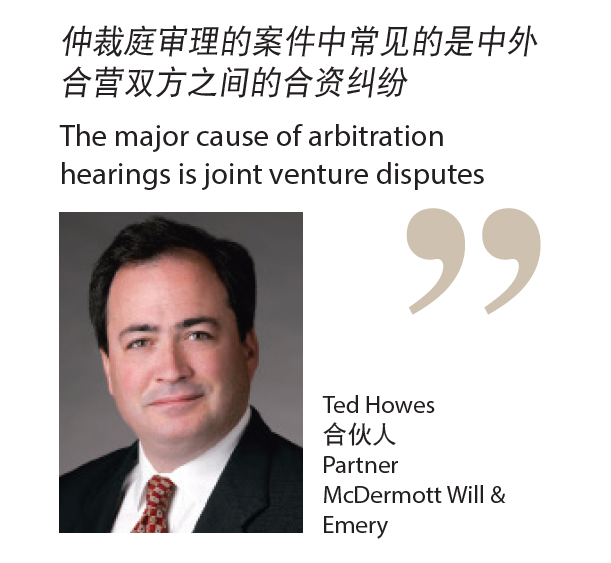
But what are the pros and cons of arbitration over other methods of dispute resolution? On the plus side, it can be quicker and cheaper than litigation, with time and costs less likely to run out of control. “The good news for parties who choose to arbitrate is that they have the chance to exercise significantly more control over the factors that may result in excessive expense and delay than they would in court proceedings,” says Justin D’Agostino, a partner with Herbert Smith in Hong Kong. “For example, parties may seek to reach agreement with the other side on an appropriately streamlined procedure for the arbitration, nominate robust tribunal members who will exercise strong control over the proceedings, and adopt a proactive approach to make representations to the tribunal on matters affecting timetable and procedure.”
However, the relatively short timescale typical for an arbitration can also be a downside. “The relatively short procedure is the reason many parties choose arbitration,” says Wang Yadong, a partner at Run Ming Law Office in Beijing. “But at the same time, this may be a risk.”
International lawyers agree. “The time frame for ‘domestic arbitration’, which includes cases involving foreign-invested Chinese companies, is too short to permit the kind of case preparation that foreign companies expect,” says Craig Celniker, co-chair of the international arbitration group at Morrison & Foerster in Tokyo. “The hearing can be scheduled for as little as 15 days after appointment of the tribunal.” he says.
The difficulty of joining a third party to arbitration proceedings can also be a drawback. “An arbitration forum generally does not have the power to force a party that is not a party to the arbitration agreement to take part in the arbitration procedures,” notes Xu Sanqiao, a partner at Jingtian & Gongcheng in Shenzhen. Xing Xiusong of Global Law Office in Beijing, who is also an arbitrator with the China International Economic and Trade Arbitration Commission (CIETAC) and a mediator with the CCPIT/CCOIC Conciliation Centre, believes this is “inconvenient”, and means that some disputes “have to be handled by stages”. And a further problem is that pre-arbitration attachment/preservation is not widely used. “To use pre-arbitration attachment/preservation, you must go through a court. The time lag can be long and it can easily fail,” says Tao Jie, a partner at Haiwen & Partners.
Historical issues
The arbitration system can also present other problems, which often have their roots in the past.
Historically, Chinese parties have generally been reluctant to enter into arbitration, especially if they are the originator of the complaint. At a conference held in July by Beijing’s Xicheng District Court on alternative dispute resolution mechanisms, one legal scholar observed that “without exception, ADR approaches come at the cost of concessions made by the complainant”.
The finality of arbitration also worries Chinese parties. “The main risk is that the arbitral award is final and there is no opportunity to change the outcome,” explains Jim Qiu, a partner at Yao Liang Law Offices in Shanghai. Wang Yadong, executive partner at Run Ming Law Office in Beijing, agrees: “If a party encounters an unfair decision in a substantial matter that is subject to arbitration, there is almost no opportunity for further legal recourse. In comparison with the opportunity of appeal to a higher court in judicial proceedings, this is the greatest risk of using arbitration”.
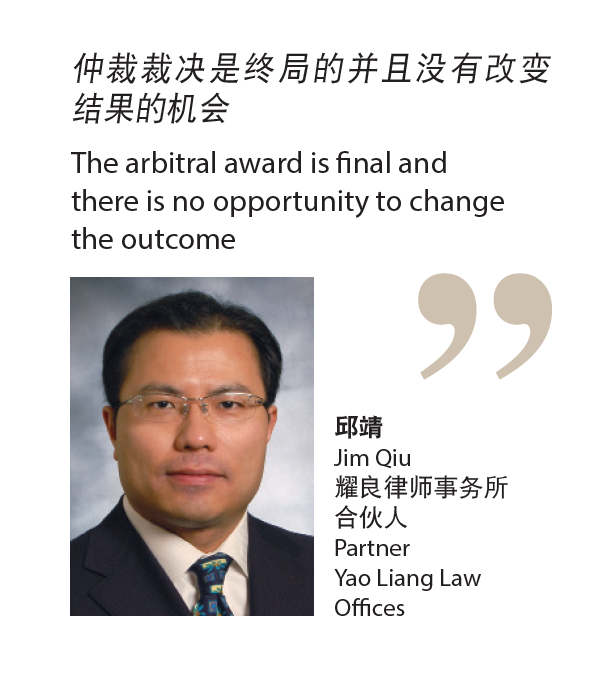
There is also a perception of corruption. “Issues of corruption turn up with disturbing frequency in commercial arbitration,” says the Dubai-based managing partner of a major law firm with extensive business in China. And foreign lawyers say Chinese arbitrators who have sided with foreign parties in major cases have subsequently been harassed or arrested as recently as 2006.
While many lawyers say the situation has improved, memories can be long. “CIETAC used to have a reputation of corruption and has difficulties in attracting reputable arbitrators,” says Joanna Zhang, an associate in the corporate practice group at Wilmer Cutler Pickering Hale & Dorr in Beijing.
So why do companies agree to arbitration within China at all? One reason, almost certainly, is the cost advantage. “The Chinese system is more cost-efficient than those in Hong Kong or Singapore,” says Chi Shaojie, a CIETAC arbitrator in Beijing.
Secondly, Chinese lawyers may advise their domestic clients to choose local arbitration centres because of familiarity. “We always advise our clients to choose CIETAC, Beijing Arbitration Commission (BAC), Hong Kong International Arbitration Centre (HKIAC), Singapore International Arbitration Centre (SIAC) and the International Chamber of Commerce (ICC) International Court of Arbitration in that order of preference,” says Ma Jie, a partner at Commerce & Finance Law Offices in Beijing. “We prefer CIETAC and BAC because we are more familiar with their procedures and there’s a long list of qualified arbitrators to choose from.”
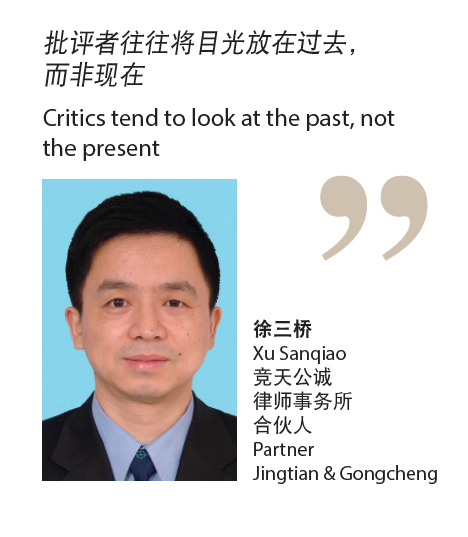
Regionally, Hong Kong and Singapore are popular destinations for China-related arbitration. “In my experience, multinational companies have a preference for Hong Kong or Singapore over China because the arbitration laws in both jurisdictions are based on the UNCITRAL Model Law,” says Yu Jin Tay, of counsel at Shearman & Sterling in Singapore, and head of the firm’s international arbitration practice in Asia. “The courts of both jurisdictions are staunchly pro-arbitration in terms of being non-interventionist yet supportive with interim relief and emergency measures when needed.” (For an examination of the major arbitration forums that are competing for business, see page 54.)
The enforcement factor
Doubt over the enforcement of arbitral awards in China remains a major obstacle, and must be taken into account when choosing an international forum such as the ICC. It can also be an issue in domestic arbitration.
According to Zhang Dong, a partner at Dacheng Law Offices in Beijing, “for arbitral rulings to be enforced, it is necessary to apply to a court”. Zhang identifies three major problems afflicting enforcement efforts. First, the party ordered to make a payment may have insufficient assets. Second, the court proceedings can drag on for a long time, and third, the court may display “prejudice” against the idea of enforcing an arbitral award.
Some Chinese lawyers accentuate the positive. “In order to ensure the enforceability of foreign-related arbitral awards, the Chinese courts have established a dedicated examination mechanism,” says Spring Chang, founding partner of Chang Tsi & Partners. “If an intermediate people’s court decides not to enforce a foreign-related arbitral award, it must report this to the higher people’s court or even to the Supreme People’s Court to examine and verify.”
Recently there have also been significant developments affecting the enforcement of awards outside the mainland PRC.
On 30 December 2009, the Supreme People’s Court issued a notice regarding the enforceability of Hong Kong arbitral awards under the Arrangement Concerning Mutual Enforcement of Arbitral Awards between the Mainland and the Hong Kong Special Administrative Region. This arrangement provided that Hong Kong awards should be, as a rule, enforceable in the Chinese courts. Exceptions under article 7 of the arrangement are largely in line with the standard grounds for refusing enforcement listed in the Convention on the Recognition and Enforcement of Foreign Arbitral Awards (known as the New York Convention).
“The notice has been interpreted as confirming the relatively pro-enforcement stance on the part of the Chinese courts,” Ronnie King of Ashurst noted in an analysis in May. Meanwhile, a recent ruling by the Ningbo Intermediate People’s Court has drawn further attention to questions over the enforceability of foreign awards, including Hong Kong arbitration awards, in China.
The so-called Ningbo case involved an objection by a Chinese respondent to the enforcement of an award rendered in favour of a Swiss claimant by an ICC tribunal seated in China (see China Business Law Journal volume 1 issue 1, page 9). The respondent objected to the enforcement proceedings on the grounds that the ICC was unable validly to render an award in China and that the true intention of the parties was to submit the dispute to CIETAC arbitration.
The Ningbo court rejected the respondent’s challenge to the validity of the award. Its reasoning was that Chinese law requires any challenges to the validity of an arbitration agreement to be made prior to the first arbitration hearing, and in this case the respondent had failed to make such a challenge. Accordingly, the court appeared to approve of the enforcement of the award. “Before this case, it was generally believed that overseas arbitration institutions could not administer arbitrations with a seat in China, or, more precisely, such foreign administered arbitration seated in China would not be recognized by the Chinese courts,” says May Tai, partner in the dispute resolution division of Herbert Smith in Shanghai.
There has been much speculation about whether this decision signals the start of court recognition of arbitrations seated in China but not administered by Chinese arbitration commissions. Judicial decisions do not create binding precedents in China and therefore the ruling by the Ningbo court is not binding on any other courts. “The Supreme People’s Court has issued directions friendlier to international arbitration,” says Robert Pé, head of the Asia litigation practice at Orrick Herrington & Sutcliffe. “But results will be patchy.”
However, Lou Jinbo at the Shenzhen Arbitration Commission notes that “the PRC Arbitration Law doesn’t address the issues on foreign arbitration commissions carrying out arbitration in China. It’s a grey area.”
A battery of obstacles
Nigeria is perhaps better known for its internet-based scammers than for legitimate businesses seeking redress over contractual disputes. However, one Nigerian company might think twice before pursuing any more arbitration in China.
Banquo Addidas, an investment group based in Surulere, near Lagos, paid about US$1 million in 2005 to Henan Light Industrial Import and Export Corporation, headquartered in Zhengzhou, for a consignment of batteries that turned out to be faulty.
Consumer advocates say poorer countries like Nigeria are plagued by substandard and unsafe imports, principally from China and India. The director-general of Nigeria’s National Agency for Food and Drug Administration and Control, Dora Akunyili, says that in many cases Nigerian importers collude with unscrupulous Chinese exporters to keep costs low, but in some cases the Nigerians are unwilling dupes.
In Banquo Addidas’s case, the battery shipment was intercepted by the Standards Organization of Nigeria, which condemned the batteries. Banquo Addidas, faced with a valueless cargo, said Henan Light Industrial Import and Export Corporation did not respond to repeated requests for refunds or resupply.
The company sought advice from a law firm, Okhai Akhigbe and Co, whose managing partner, Mike Okhai Akhigbe, is a former vice-president of Nigeria and a retired vice-admiral of the country’s navy. He is also chairman of the advisory board of the Maritime Arbitrators Association of Nigeria.
Okhai Akhigbe and Co petitioned the Chinese consulate in Lagos, which recommended a hearing before the China International Economic and Trade Arbitration Commission (CIETAC). “Under the cooperation agreement between Banquo Addidas and the supplier, arbitration was specified as the sole medium for resolution of all disputes arising from the transaction,” says Chris Imachukwu, the Nigerian lawyer who initially handled the case.
In 2008, Banquo Addidas filed a claim with CIETAC after engaging a Beijing law firm, GoldenGate, which specializes in litigation, international and local arbitration and other forms of alternative dispute resolution.
Tim Meng, GoldenGate’s managing partner, believed he had a straightforward case. “After receiving and distributing the goods, Banquo Addidas found that an irreparable quality problem persisted,” Meng says. The batteries had developed serious leaks en route to Nigeria, and the Standards Organisation of Nigeria deemed them unfit to be marketed.
Henan Light Industrial declined to comment on the case. A sales manager, who declined to be named but said he recalled the dispute when contacted by email, said the company outsourced production of the batteries to another manufacturer in nearby Shangqiu. That company made the batteries with cheaper, substandard materials after claiming that Henan Light Industrial had underpaid it.
As GoldenGate prepared its submission to CIETAC, Imachukwu was at first impressed by the efficiency of the process. “The arbitration process is fairly simple because once a date has been set the hearing could be completed in one day,” he recalls. The entire case took 18 months from filing to award, which he thought was fair, given its complexity.
However, the CIETAC panel’s conclusion proved a moral victory for the Nigerians but a financial disappointment. Banquo Addidas had claimed the US$1 million in losses over the battery shipment plus legal costs but the CIETAC award totalled only US$270,000. “Bear in mind that we spent US$112,000 in filing fees alone,” says Imachukwu.
KK Cheung, a partner at Deacons in Hong Kong who sits on CIETAC panels as an arbitrator, says CIETAC charges are proportional to the size of the claim, not the award. Although Hong Kong arbitration panels charge only nominal filing fees, the arbitrators’ time is expensive: HK$3,000-5,000 (US$387-645) per hour. “For a smaller claim, it’s much cheaper to arbitrate in China than Hong Kong,” Cheung says.
Given the paucity of the award, the Nigerians suspected an unseen hand at work. “I don’t know what criteria were used for arriving at the award,” Imachukwu says. “It is possible that the tribunal did not lose sight of the fact that the supplier is a government corporation and I cannot testify to the independence of the tribunal.”
Such a reaction is common, say other lawyers not involved in the case. There is a perception that state-owned corporations are treated more leniently than others at CIETAC and other Chinese arbitration tribunals, they add. “There are concerns about enforcement if you’re up against a government enterprise,” Cheung acknowledges.
Furthermore, Banquo Addidas has not yet seen even the sum that was awarded. “The award has not been enforced,” says Imachukwu. “We are in the process of filing documentation for that, although I am told from experience that most provincial companies do all they can to frustrate the enforcement of awards.”
Enforcement at home
It might be assumed that awards from domestic Chinese bodies would be more easily enforced. The domestic arbitration commissions themselves claim enforcement is not a problem.
According to Yu Jianlong of CIETAC, in the past few years CIETAC has seen “very few foreign and foreign-related arbitral awards which have been judged unenforceable by the courts. Of these, some were because the party ordered to pay did not exist, or had gone bankrupt, or its assets could not be executed. Also some awards are not enforced because the arbitration procedures are not correct, or the arbitration agreement was invalid, or because the parties applied to the court for enforcement after the limitation period expired”.
Chen Cong, a senior official with the BAC, says that most of the arbitral awards rendered by the BAC have been enforced by the courts. “In order to guarantee the enforcement of arbitral awards, the Supreme People’s Court issued a judicial interpretation to order the intermediate courts to enforce awards,” he says. “This will help the parties to get arbitral awards enforced.”
And some lawyers, too, strike an optimistic note. “In our experience, the PRC intermediate courts, to which applications for recognition and enforcement of arbitral awards are made, are generally diligent in considering the application and applying their minds to it,” says Yang Ing Loong, a partner at Sidley Austin in Singapore.
Others say oversight on the enforcement (and investigation into the overturning or cancellation) of awards is much better than 10 years ago. “There is a reporting system,” says Franki Cheung at Deacons. “If the intermediate people’s court in Beijing refuses to enforce an award, it must report this fact to the higher people’s court before giving the judgment to the parties. If the higher people’s court is of the same opinion, it must be reported to the Supreme People’s Court.” Of course, while such a system might seem fairer to aggrieved parties in arbitration, it slows the overall progress. “The downside is it takes more time to go through three courts,” Cheung says.
Indeed, since ratifying the New York Convention, Chinese courts are reported to have refused enforcement of an award based on the contrary to “public policy” ground contained in the convention on only one occasion, according to Cameron Hassall, a partner and head of the Hong Kong and China arbitration practice at Clifford Chance in Hong Kong.
Domestic-foreign divisions blur
Views of the major arbitration centres in China appear less divided along national lines than may have been the case in the past.
Many foreign lawyers still recommend against conducting any arbitration in China. “You want to avoid arbitration inside the mainland,” Howes advises from New York. Celniker in Tokyo echoes this. “China’s law is non-transparent. It must be made more transparent and outcomes must be more predictably based on the merits.”
And some PRC lawyers acknowledge that the low esteem in which China’s legal system is held internationally reflects badly on its arbitration system, despite recent efforts at modernization. “Many multinationals do not choose CIETAC arbitration because they do not trust the PRC legal system as a whole,” says Liu Yulin, a partner at the Zhong Lun Law Firm in Beijing.
Wang Yadong of Run Ming Law Office believes such lack of trust can be justified. “The arbitrators chosen by one side in a domestic arbitration are almost always partial to that party, to the extent of being called their ‘second agent’. This is especially the case if the arbitrator is also a practising lawyer. They can often blur their role in the arbitration.” Wang also notes that choice of location can be important. “Because local arbitration commissions often find it difficult to separate themselves from local governments, generally speaking, where local parties are involved in a transaction, we don’t recommend foreign parties to opt for local arbitration commission in their contracts”.
According to Xing of Global Law Office, Chinese arbitration bodies need to “become more specialized, reduce administrative interference and become genuinely independent”.
But on the whole, Chinese domestic lawyers tend to be broadly supportive of the arbitration system. “I can attest to CIETAC’s ability to effectively resolve domestic as well as complex international disputes,” says Zhan Hao, executive partner at Grandall Legal Group in Beijing. “It provides rules similar to those of many other international arbitral institutions and carefully records qualified domestic and international arbitrators.”
Others are more strident in their defence of China-sited arbitration, saying that the reality is not the same as the perception. “The arbitration procedure is professional, but has been misunderstood by the general public,” says Xu Jiali, executive partner at Longan Law Firm in Beijing, referring to both domestic and foreign-invested companies that have engaged in arbitration without reasonable expectation and full understanding of the consequences.
Some say negative beliefs about China’s legal and arbitration system are out of date. “Due to some traditional opinions about the Chinese judicial system held by other countries, the enforceability for arbitration awards in China is always questioned by foreign parties,” says Qiu.
Xu Sanqiao at Jingtian & Gongcheng agrees that China has moved on. “Critics tend to look at the past, not the present,” he says. “Given our previous experience of representing foreign parties in enforcing arbitral awards, we are fully confident of the enforceability of arbitral awards in China.”
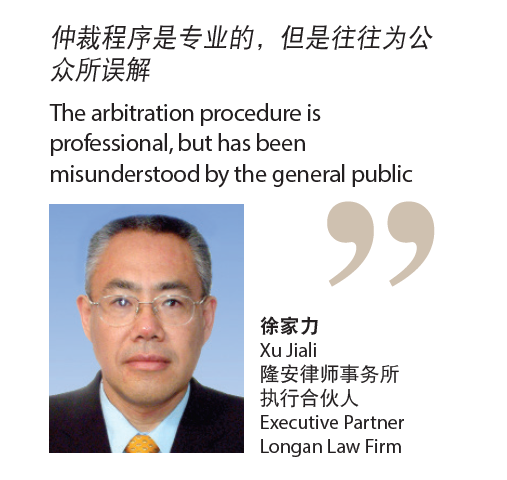
Nevertheless, lawyers have urged China’s government to pass better legislation to improve the arbitration climate. “The key lies in the national legislature to pass legislation to improve the independence of national arbitration institutions and improve transparency and efficiency in the implementation phase,” says Donna Li, a partner at Allbright Law Offices in Shanghai.
In Hong Kong, lawyers are generally supportive of mainland arbitration despite the presence of the HKIAC as an alternative venue. “There have been some good quality awards from CIETAC; they really spend time on them,” says KK Cheung, a partner at Deacons in Hong Kong. “If there’s a complex aspect, the chairman of CIETAC will appoint an expert or even a panel of experts to give advice on a point of law.”
Lawyers have noticed that as China arbitration centres institute reforms, their costs rise. “There have been delays in adversarial arbitration proceedings, and arbitration costs and expenses seem to have escalated,” says Tao Jie of Haiwen & Partners in Beijing. “It’s an increasing trend. Enterprises might consider mediation before arbitration in order to resolve lesser controversies.”
Arbitrators themselves are confident about Chinese arbitration’s ability to deliver a reasonable result – at least in contrast to their judicial counterparts. “Frankly speaking, arbitration is much more trustworthy than judicial jurisdiction in China nowadays due to its truly independent and impartial high professional standard,” says Chi, who adds that disappointing arbitration results are often due to incompetence by lawyers who nominate inappropriate or inexperienced arbitrators.
Choosing the right arbitrator is a key matter, law firms say. James Rowland, an adviser in King & Wood’s international litigation and arbitration practice, offers a checklist for selecting an arbitrator: “Does the arbitrator have a reputation as someone who is energetic and works hard? The volume of submissions filed in arbitrations can be overwhelming. Is the arbitrator among the very well-known and reputable arbitrators? If so, it may often be difficult to schedule hearings with him or her at times that are convenient. In certain fields, even the best arbitrators might not have as good knowledge and experience as ordinary judges who handle a high volume of cases.”
Clients can sometimes be to blame for appointing substandard arbitrators. CIETAC and other major arbitration centres offer panels of hundreds of arbitrators from the mainland of China, Hong Kong and elsewhere. Normally, each party nominates one arbitrator and agreement is reached on the third, who serves as chairman of the arbitration panel. “It would be of help to mitigate the danger if the clients could pay more attention to selection of an arbitrator who is a real professional in the area of dispute,” says Tao Xiuming, a partner at JunZeJun Law Offices in Beijing.
Some suggest China’s arbitration is negatively viewed as a result of poor marketing efforts. “Chinese arbitration organizations should improve their image,” says Zhang Dong at Dacheng Law Offices. “It is necessary to increase the intensity of external publicity and promotion to make the world more understanding of and give more recognition to China’s arbitration system.”
Others suggest the appointment of more foreign arbitrators to give the panels a more authoritative reputation. “Chinese arbitration organizations should be more international and bringing in more foreign arbitrators,” says Frank Liu, head of the dispute resolution department at Chang Tsi & Partners in Shanghai. Liu agrees that better publicity is needed “so that more people understand China’s national arbitration institutions”.
“CIETAC should make more effort in terms of independence and transparency,” says Xu of Jingtian & Gongcheng. And Wang at Run Ming believes that “CIETAC and others would benefit from adopting well known international rules as a confidence building gesture, rather than trying to make their own rules”.
Work in progress
While arbitration in China has its drawbacks, many lawyers suggest a couple of easily achievable improvements to enhance its international status. “One, reduce administrative intervention to achieve real independence and, two, improve the remuneration of the arbitrators,” says Xing at Global Law Office. “It requires more professionals to put in more effort to improve the status of arbitration in China.”
Some international lawyers see Chinese arbitration as a work in progress. “The mainland is definitely better than it was, especially since the 2005 changes to the arbitration rules involving party autonomy,” says Pé. “Parties are able to specify that a chairman must not be a PRC national, that arbitration is handled in a particular way with regard to cross-examination or discovery, and that arbitrators cannot turn into mediators and then revert back into arbitrators.”
Pé adds that the net result of recent changes has been an improved environment for non-Chinese parties: “All of these changes are geared to foreign investors.” CIETAC concurs with this sentiment. “CIETAC is very willing to work with domestic and foreign colleagues and parties together to explore effective means of dispute resolution and arbitration in China and jointly promote the development and progress of arbitration throughout the world,” says Yu.
Arbitration bodies: a user guide
Beijing Arbitration Commission
The Beijing Arbitration Commission (BAC) was established in 1995 with the aim of being a more efficient alternative to CIETAC. An average case at BAC takes 70 days from acceptance to decision, according to Chen Cong, a senior BAC official. Chen says BAC has devoted much effort to improving the quality of arbitrators, a frequent sticking point for parties involved in China arbitration. “Before being listed on the panel, domestic arbitrators must pass the arbitrator training programme at Tsinghua Law School,” he says. “While foreign arbitrators do not need to pass the training, they have to be experienced in international arbitration.”
Imposing such requirements for arbitrators make BAC a strong competitor to CIETAC, says Tim Meng, managing partner of the GoldenGate law firm in Beijing.
China International Economic and Trade Arbitration Commission
China International Economic and Trade Arbitration Commission (CIETAC) is the traditionally pre-eminent institution engaging in foreign-related arbitration in China, and is the world’s busiest arbitration institution in terms of the number of cases handled. According to Terence Tung, a partner at Mayer Brown in Beijing, CIETAC accepted 1,230 cases for arbitration in 2008, nearly twice as many as the International Chamber of Commerce (ICC), which is far better known outside China.
CIETAC was established in 1956, in contrast to other PRC arbitration bodies, which all date from after the promulgation of the PRC Arbitration Law in 1995. Many CIETAC arbitrators are foreigners.
In addition to CIETAC’s Beijing headquarters, it also has a south China sub-commission in Shenzhen, a Shanghai sub-commission, a South West China sub-commission in Chongqing, and the Tianjin International Economic and Financial Arbitration Centre in Tianjin.
CIETAC has formed alliances with several international and foreign arbitration institutions. In June 2010, CIETAC deputy secretary-general Yang Chunlei visited the Dubai International Arbitration Centre, another regional forum with global ambitions, to foster relations and exchange ideas and expertise. CIETAC has also recently sought better ties with its Taiwan counterpart.
Meng believes that while CIETAC in Beijing maintains high standards, the “quality of CIETAC Shanghai and CIETAC Shenzhen can be below one’s expectations.” However he believes that CIETAC Tianjin is beginning to establish itself as a centre specialized in banking matters.
China Maritime Arbitration Commission
One Chinese arbitration body that appears to win across-the-board plaudits in terms of procedure and impartiality is the China Maritime Arbitration Commission (CMAC). Based in Beijing and with a sub-commission in Shanghai, it is the major arbitral body in China to focus on maritime and shipping disputes.
According to Chen Bo, CMAC’s deputy secretary general, CMAC has established an Arbitrators Qualification Examination Committee which helps to ensure the quality of arbitrators. But Chen says a major challenge is to keep up with developments in the logistics industry.
“I have reviewed quite a few maritime arbitration awards issued by the CMAC and did not find them very different from those by maritime arbitrators in London, New York, Paris or Moscow,” says Michael Marks Cohen, of counsel at Nicoletti Hornig & Sweeney in New York and the only American lawyer on the CMAC panel of arbitrators.
“The problem in dispute resolution by maritime arbitration in China does not appear to be the fairness of the proceedings but rather the collection of awards,” says Cohen.
Hong Kong International Arbitration Centre
HKIAC has positioned itself as a major venue for China-related arbitration, and is about to celebrate its 25th anniversary. Chiann Bao, the recently appointed HKIAC secretary-general, points to Hong Kong’s score when it comes to the major factors that are typically considered when deciding a venue for arbitration. These include the status of the New York Convention, neutrality, rule of law, expertise, and court support for arbitration. “Hong Kong has been well recognized as one of the leading arbitration centres in the Asia-Pacific region for years,” she says.
Bao’s predecessor, Gary Soo, says Hong Kong is still one of the popular choices. “Looking at HKIAC, for example, the number of cases involving Chinese parties keeps on growing,” he says. Soo, now head of Gary Soo’s Chambers in Hong Kong, notes that Hong Kong’s neutral-venue status for arbitration, convenience in location, ease of access to a pool of experienced lawyers and arbitrators familiar with such disputes and with expertise and language capabilities; up-to-date arbitration law; and responsive and reputable arbitration institution are also factors taken into account by parties choosing to arbitrate in Hong Kong.
However, Hong Kong’s prime advantage is its separate legal system and more developed legal infrastructure. “Many companies outside China prefer, for various reasons, not to arbitrate in China,” says Peter Chow, a partner who leads the Asian international arbitration and dispute resolution practice at Bryan Cave in Hong Kong. “Many of them are comfortable with Hong Kong because of its strong legal and regulatory regime and its judiciary, which is supportive of arbitration. Many Chinese companies also prefer Hong Kong if they have to arbitrate outside mainland China.”
The HKIAC has been attracting particularly high-value arbitration cases, lawyers say. “The highest value cases come to Hong Kong, unless both parties are Chinese entities,” says Robert Pé, a partner and head of the Asia litigation practice at Orrick Herrington & Sutcliffe in Hong Kong. “Hong Kong is vastly preferable in terms of choice of lawyers and support for the courts. If a compromise is necessary, it is better to compromise on the governing law than the venue.”
Orrick recently acted for a US-based investment management firm in an HKIAC arbitration against a Hong Kong-listed real estate developer, obtaining an interim award requiring the adverse party, a Chinese real estate company, to pay more than US$164 million into an escrow account and achieving a US$200 million settlement of principal and interest through mediation.
According to Wang Yadong, executive partner at Run Ming Law Office, Hong Kong serves as a good choice of neutral venue for arbitration. “Hong Kong should be the first choice, unless the foreign party is a Hong Kong company,” he says. “Hong Kong’s arbitration bodies have a good reputation for independence and fairness, and stand in a neutral position between Chinese and foreign parties. Also, arbitration bodies in Hong Kong commonly allow the use of Chinese as the language of arbitration, and it is relatively convenient and cheap for people from mainland China to travel there. That means a Chinese party will not have any reason to reject Hong Kong arbitration; moreover, arbitral awards can be recognized and enforced in mainland China.”
Nevertheless, some lawyers in Hong Kong sound a note of caution. “Hong Kong has more experienced arbitrators but, in comparison with China, it is not a matter of quality but of style,” says Franki Cheung, a partner and head of the China practice group at Deacons in Hong Kong.
According to Richard Hill, a partner at Fulbright & Jaworski in Hong Kong, “Hong Kong’s role is becoming more international. While it has always seen a lot of domestic construction and commercial arbitrations, it is now successfully positioned as an ideal compromise venue for disputes between Chinese parties and Western parties.”
The ICC International Court of Arbitration
The International Chamber of Commerce (ICC) styles itself “the world’s business organization”. The ICC International Court of Arbitration handles over 500 arbitration cases each year.
“China-related arbitration proceedings administered by the ICC are usually seated in Hong Kong, Singapore or other countries but very seldom in Mainland China,” says Brenda Horrigan, the Shanghai-based co-head of the international arbitration practice Group at Salans. “The principal reason for this is a requirement from the PRC Arbitration Law that the establishment of an arbitration institution in China must be registered with judicial and administrative departments. The ICC and other foreign arbitration institution are not “registered” as arbitral institutions in Mainland China, and thus are generally believed not to meet this requirement.”
Shenzhen Arbitration Commission
According to Lou Jinbo of the Shenzhen Arbitration Commission (SZAC), most of the cases heard by the commissionare domestic, although it also conducts foreign-related cases, mostly involving parties from Hong Kong, Macau and Taiwan. “This began in the early 1990s because of the large number of Hong Kong investors and companies in Shenzhen,” says Lou. “A particular issue was the property disputes arising from the purchase of property in Shenzhen by Hong Kong people.”
Shanghai Arbitration Commission
According to figures publicized by the Shanghai Arbitration Commission, the number of cases it handled peaked at 1600 in 2005 and has since remained over 1000 per year.
Perhaps as a manifestation of Shanghai’s ambitions to position itself as both a world financial centre and an international shipping hub, the between 2007 and 2009 the Shanghai Arbitration Commission consecutively set up the Shanghai Court of Financial Arbitration, Shanghai Court of Intellectual Property Arbitration and the Shanghai Court of International Shipping Arbitration.
Singapore International Arbitration Centre
Tax-exempt status has been given to foreign arbitrators to encourage this method of dispute resolution at the Singapore International Arbitration Centre (SIAC), which has emerged as a major competitor for HKIAC on the China arbitration stage. One claimed advantage is that Singapore is more definitively seen as not being China, despite Hong Kong’s separate legal structure from the mainland.
“Singapore is treated as a more ‘neutral’ place by both Chinese parties and foreign parties,” says Ge Huangbin, head of China operations at SIAC.
Ge says Singapore also benefits from being in the same time zone as China. It touts an expedient process, including the provision of emergency arbitrators and a more transparent cost structure. Pé says the Singapore government has invested a lot of time and money in promoting SIAC. “The Maxwell Chambers complex is physically impressive and that is paying dividends without a doubt,” he says. “It will soon be up there with Hong Kong.”
Other lawyers are more cautious, pointing to SIAC’s heavily Southeast Asian focus. “Hong Kong is Asia’s leading centre for arbitration, despite Singapore’s excellent and vigorous efforts to promote itself,” says Richard Hill, a partner with Fulbright & Jaworski in Hong Kong.






